

10 books you need to read if you're taking a four-week TESOL course. It’s been 15 years since I took my language teaching certificate course and here I am, still going strong!
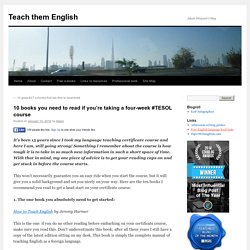
Something I remember about the course is how tough it is to take in so much new information in such a short space of time. With that in mind, my one piece of advice is to get your reading caps on and get stuck in before the course starts. This won’t necessarily guarantee you an easy ride when you start the course, but it will give you a solid background and set you nicely on your way. Here are the ten books I recommend you read to get a head start on your certificate course: 1. 10 great ELT e-books that are free to download.
As those of you who drop by regularly will have seen, I’ve recently been involved in the production of a free e-book of ‘controversial’ lesson plans (if you missed my last post, take a look).
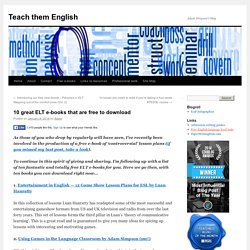
To continue in this spirit of giving and sharing, I’m following up with a list of ten fantastic and totally free ELT e-books for you. Here we go then, with ten books you can download right now… 1. Entertainment in English — 12 Game Show Lesson Plans for ESL by Luan Hanratty In this collection of lessons Luan Hanratty has readapted some of the most successful and entertaining gameshow formats from US and UK television and radio from over the last forty years. 2.
OK, this might seem like shameless self-promotion, but as this is in the top 5 of downloaded ELT books on Smashwords, I feel justified in plugging it here! 3. Just in case you did download Vol. 2 which I mentioned in my last post, make sure you don’t miss out on Vol.1! 4. 5. 6. 7. Post-CELTA professional development: Dogme materials. Can you believe it?
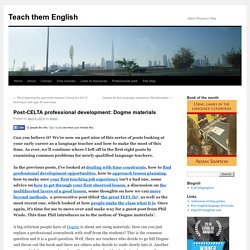
We’re now on part nine of this series of posts looking at your early career as a language teacher and how to make the most of this time. As ever, we’ll continue where I left off in the first eight posts by examining common problems for newly qualified language teachers. In the previous posts, I’ve looked at dealing with time constraints, how to find professional development opportunities, how to approach lesson planning, how to make sure your first teaching job experience isn’t a bad one, some advice on how to get through your first observed lesson, a discussion on the multifaceted layers of a good lesson, some thoughts on how we can move beyond methods, a provocative post titled ‘the great TEFL lie‘, as well as the most recent one, which looked at how people make the class what it is. Once again, it’s time for me to move over and make way for a guest post from Phil Wade. This time Phil introduces us to the notion of ‘Dogme materials’. Think about it. Post-CELTA professional development: People make the class.
Well… here we go again with the eighth part of this series of posts looking at your early career as a language teacher and how to make the most of this time.
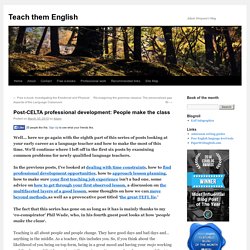
We’ll continue where I left off in the first six posts by examining common problems for newly qualified language teachers. In the previous posts, I’ve looked at dealing with time constraints, how to find professional development opportunities, how to approach lesson planning, how to make sure your first teaching job experience isn’t a bad one, some advice on how to get through your first observed lesson, a discussion on the multifaceted layers of a good lesson, some thoughts on how we can move beyond methods,as well as a provocative post titled ‘the great TEFL lie.’ The fact that this series has gone on as long as it has is mainly thanks to my ‘co-conspirator’ Phil Wade, who, in his fourth guest post looks at how ‘people make the class‘.
Teaching is all about people and people change. Post-CELTA professional development: The great TEFL lie. Well… here we go again with the seventh part of this series of posts looking at your early career as a language teacher and how to make the most of this time.
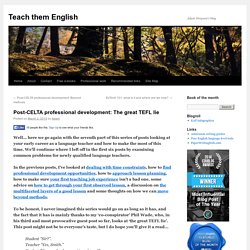
We’ll continue where I left off in the first six posts by examining common problems for newly qualified language teachers. In the previous posts, I’ve looked at dealing with time constraints, how to find professional development opportunities, how to approach lesson planning, how to make sure your first teaching job experience isn’t a bad one, some advice on how to get through your first observed lesson, a discussion on the multifaceted layers of a good lesson and some thoughts on how we can move beyond methods.
To be honest, I never imagined this series would go on as long as it has, and the fact that it has is mainly thanks to my ‘co-conspirator’ Phil Wade, who, in his third and most provocative guest post so far, looks at ‘the great TEFL lie’. Post-CELTA professional development: Beyond methods. Welcome back, dear friends, to the sixth part of my ever-expanding series of posts looking at your early career as a language teacher and how to make the most of this time.
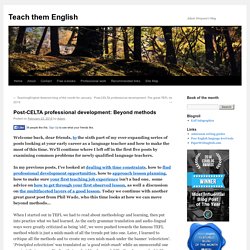
We’ll continue where I left off in the first five posts by examining common problems for newly qualified language teachers. In my previous posts, I’ve looked at dealing with time constraints, how to find professional development opportunities, how to approach lesson planning, how to make sure your first teaching job experience isn’t a bad one, some advice on how to get through your first observed lesson, as well a discussion on the multifaceted layers of a good lesson. Today we continue with another great guest post from Phil Wade, who this time looks at how we can move beyond methods… When I started out in TEFL we had to read about methodology and learning, then put into practice what we had learned.
So, fast forward a few years and I then found out that all methods were dead and that I was free to do whatever. Post-CELTA professional development: The many levels of a good lesson. Post-CELTA professional development: 10 techniques for dealing with your first observed lesson. Welcome back, finally, to the fifth part of my series of posts looking at your early career as a language teacher and how to make the most of this time.
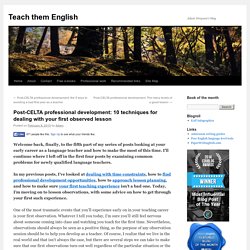
I’ll continue where I left off in the first four posts by examining common problems for newly qualified language teachers. In my previous posts, I’ve looked at dealing with time constraints, how to find professional development opportunities, how to approach lesson planning, and how to make sure your first teaching experience isn’t a bad one. Today, I’m moving on to lesson observations, with some advice on how to get through your first such experience. One of the most traumatic events that you’ll experience early on in your teaching career is your first observation. Whatever I tell you today, I’m sure you’ll still feel nervous about someone coming into class and watching you teach for the first time. 1) Be clear what your aim is What are your learners going to be able to do by the end of the class that they can’t do at the beginning? Post-CELTA professional development: the 5 keys to avoiding a bad first year as a teacher. Post-CELTA professional development: approaches to lesson planning.
This is the third in a new series of posts for the start of 2015 in which I’ll offer simple solutions to the most common problems for newly qualified language teachers.
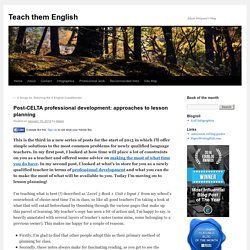
In my first post, I looked at how time will place a lot of constraints on you as a teacher and offered some advice on making the most of what time you do have. In my second post, I looked at what’s in store for you as a newly qualified teacher in terms of professional development and what you can do to make the most of what will be available to you. Today I’m moving on to lesson planning! I’m teaching what is best (!) Described as ‘Level 3 Book 1 Unit 1 Input 1’ from my school’s coursebook of choice next time I’m in class, so like all good teachers I’m taking a look at what that will entail beforehand by thumbing through the various pages that make up this parcel of learning.
Lesson planning is vital, no matter how many years you’ve been in the job. PART ONE: Two standard formats for planning a lesson Content Instructions. Post-CELTA professional development: what teacher education awaits you in the first five years? Post-CELTA professional development: working within time constraints. This is the first in a new series of posts for the start of 2015 in which I’ll offer simple solutions to the most common problems for newly qualified language teachers.
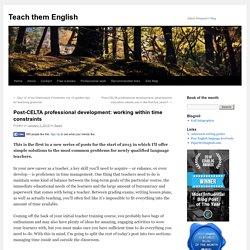
In your new career as a teacher, a key skill you’ll need to acquire – or enhance, or even develop – is proficiency in time management. One thing that teachers need to do is maintain some kind of balance between the long-term goals of the particular course, the immediate educational needs of the learners and the large amount of bureaucracy and paperwork that comes with being a teacher. Between grading exams, writing lesson plans, as well as actually teaching, you’ll often feel like it’s impossible to fit everything into the amount of time available. Coming off the back of your initial teacher training course, you probably have bags of enthusiasm and may also have plenty of ideas for amazing, engaging activities to wow your learners with, but you must make sure you have sufficient time to do everything you need to do.